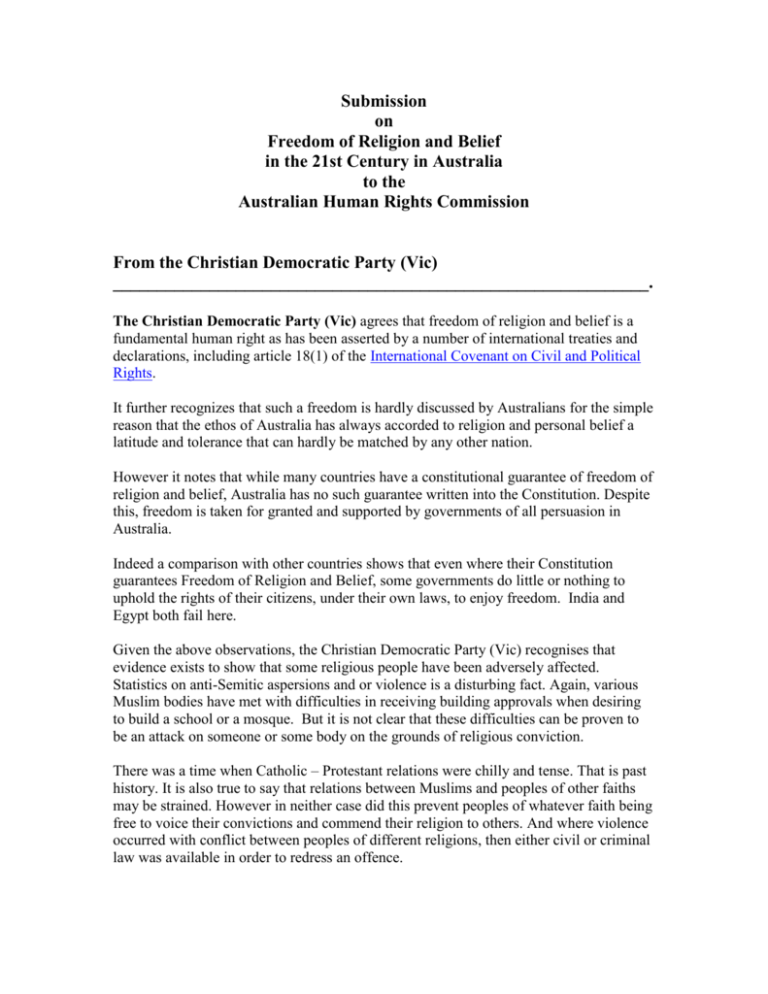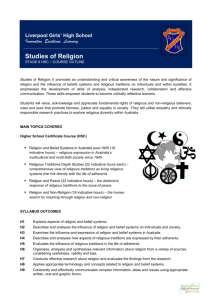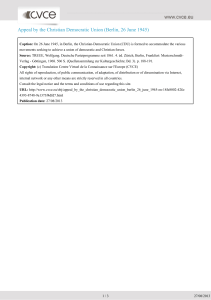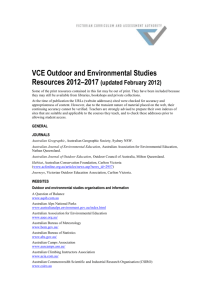The CDP agrees that freedom of religion and belief is a fundamental
advertisement

Submission on Freedom of Religion and Belief in the 21st Century in Australia to the Australian Human Rights Commission From the Christian Democratic Party (Vic) _____________________________________________________________. The Christian Democratic Party (Vic) agrees that freedom of religion and belief is a fundamental human right as has been asserted by a number of international treaties and declarations, including article 18(1) of the International Covenant on Civil and Political Rights. It further recognizes that such a freedom is hardly discussed by Australians for the simple reason that the ethos of Australia has always accorded to religion and personal belief a latitude and tolerance that can hardly be matched by any other nation. However it notes that while many countries have a constitutional guarantee of freedom of religion and belief, Australia has no such guarantee written into the Constitution. Despite this, freedom is taken for granted and supported by governments of all persuasion in Australia. Indeed a comparison with other countries shows that even where their Constitution guarantees Freedom of Religion and Belief, some governments do little or nothing to uphold the rights of their citizens, under their own laws, to enjoy freedom. India and Egypt both fail here. Given the above observations, the Christian Democratic Party (Vic) recognises that evidence exists to show that some religious people have been adversely affected. Statistics on anti-Semitic aspersions and or violence is a disturbing fact. Again, various Muslim bodies have met with difficulties in receiving building approvals when desiring to build a school or a mosque. But it is not clear that these difficulties can be proven to be an attack on someone or some body on the grounds of religious conviction. There was a time when Catholic – Protestant relations were chilly and tense. That is past history. It is also true to say that relations between Muslims and peoples of other faiths may be strained. However in neither case did this prevent peoples of whatever faith being free to voice their convictions and commend their religion to others. And where violence occurred with conflict between peoples of different religions, then either civil or criminal law was available in order to redress an offence. Where this did happen, it occurred in a context where empirical evidence was produced and a judgment made on the facts. Therefore the Christian Democratic Party (Vic) expresses its concern with any proposal to table a bill which may be drafted with respect to freedom of religion and belief. The previous government wisely chose not to proceed in that direction. For more than 200 years, Australia has enjoyed great harmony among its increasingly diverse population. This shows that there is no need for any Act touching religious freedom. First, because of the long history of amicable relations without such an Act. Second, there is no public outcry for it now. Third, sufficient laws already exist with which to deal with complaints be they civil, criminal or otherwise. Fourth, there is always the possibility that such an Act would only serve the purposes of those whose which to silence all criticism and critiques of their religion. Let it be noted that while the intention of such an Act may be laudable, the results may not be. We have seen the disastrous results flowing from the action brought by the Islam Council of Victoria against two Christian ministers, under the Victorian Racial & Religious Tolerance Act 2001 and the Human Rights and Equal Opportunity Commission. This unnecessary Act, which former NSW Premier Bob Carr called ‘bad law’ allowed gross injustice to be perpetrated until, fortunately, the courage of two Christian ministers who knew they had nothing to apologise for, prevailed, and the case was resolved. The enormous costs they sustained only served to show the damage wrought by ill-conceived and unnecessary legislation. Again, should it occur in the future that people allege they are victims of discrimination anti-discrimination laws already exist which can deal with such offences. It is now about ten years since the Joint Standing Committee on Foreign Affairs, Defence and Trade released its report after the 1998 Inquiry into Freedom of Religion and Belief, titled Compassion and Conviction. We do not believe that there has been any significant change in the level of overall harmony within the Australian population. A survey of the Australian scene shows that relations between peoples of different faith are generally amicable. The most likely source of tension will emerge, in our view, from Muslims in Australia. The experience of countries overseas shows that where Islam achieves critical mass in a host country and pushes for special consideration to be given to Muslims over a range of issues, then others become restive and resentful. This is especially acute for there is no history of Hindus or Buddhists creating tensions in countries which host them. This may be the only ground upon which an act concerning religious freedom, could be considered appropriate. However, sufficient laws already exist to take care of emerging situations. But if such an act were promulgated it would need to avoid restrictions placed upon a peoples of various religions proselytizing or commending their religion to others. restrictions placed upon any religious people criticizing another’s religion, its practices and its sacred writings; laying down grounds upon which one person may claim to be offended by what another person says or does, providing that nothing is done to the disturbance of the public peace denying anyone the right to freely express their faith and at the same time to critique another’s religion. Respectfully submitted by The Christian Democratic Party (Vic)






